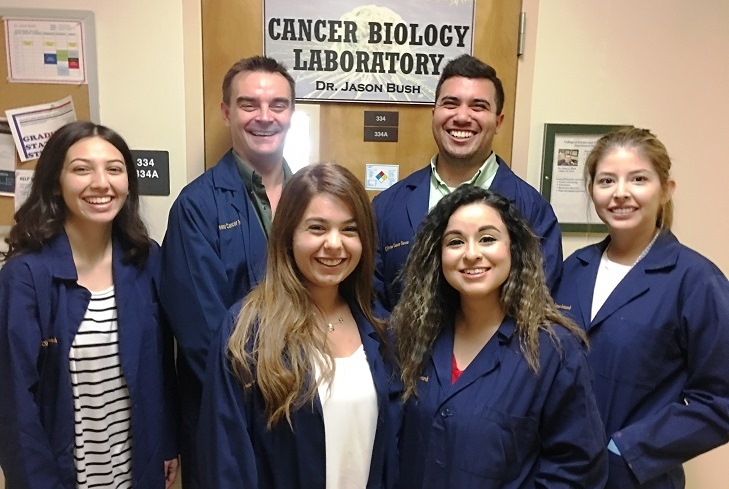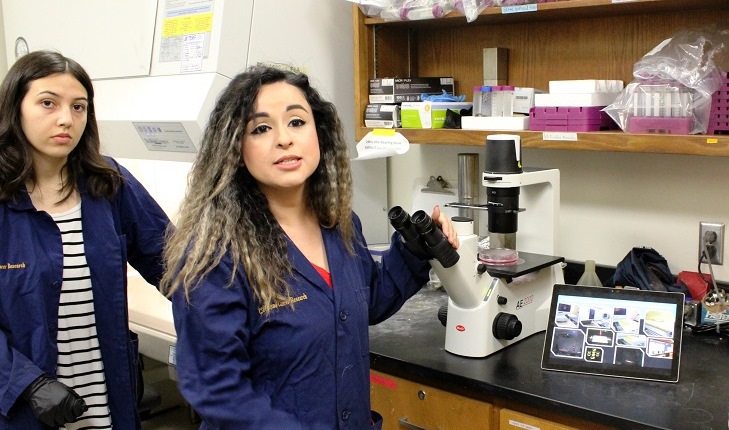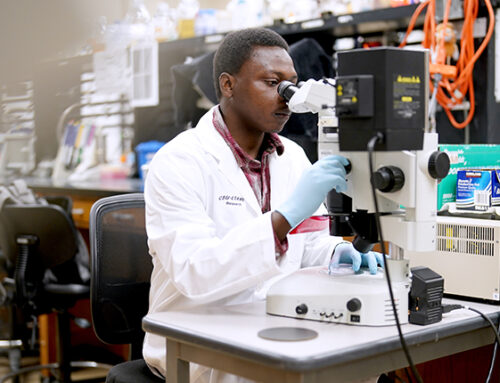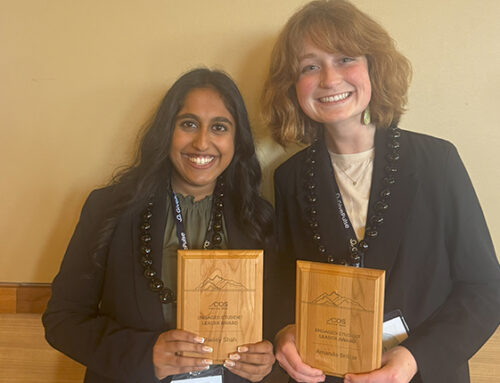(November 9, 2017) — In an unpretentious lab on the Fresno State campus, Dr. Jason Bush, professor of biology, is looking for ways to target biological mechanisms that fuel cancer.
Clues to cutting-edge cancer research may be found in metabolites, small molecules that could hold the secret to better quality of life for patients diagnosed with brain or breast cancer.
“Personalized medicine is the way of the future,” Bush said. “It’s about really understanding you, your own genetics and the genetics of the cancer to help refine the treatment.”
Bush’s work with biology students is just one of the latest research projects underway in the College of Science and Mathematics at Fresno State, which recently received two major gifts to further its mission “to graduate the next generation of scientists and mathematicians, teachers, technicians, health professionals and field researchers.”
A $1 million gift from a donor who wishes to remain anonymous was announced Oct. 24 by University President Joseph I. Castro with half allocated to student research in genetics and molecular biology and the other half for The President’s Circle for Excellence.
A week later, Castro joined Chevron in announcing a $450,000 donation to Fresno State in support of science, technology, engineering and math (STEM) programs in Fresno State’s Lyles College of Engineering and College of Science and Mathematics.
Also on Oct. 30, the College of Science and Mathematics celebrated the grand opening of two newly renovated biology and chemistry laboratories on the first floor of the Science I building. This project is the first significant remodel for the college in over a decade and allows for data collection and analyses that are critical for preparing students for future science careers, said Dr. Christopher R. Meyer, dean of the College of Science and Mathematics.
Some previous college projects include groundbreaking research that played a key role in developing a new approach to understanding the role of environmental toxins in ALS and Alzheimer’s disease with Dr. Joy Goto and a program that researched the correlation between pesticides and breast cancer among Latina farm workers with Bush.
His current work involves refining cancer treatments by studying stem cells.
“Humans are merely extrapolations of all their trillions of cells, but stem cells are special,” Bush said. “They have the potential to develop into different cell types throughout the body, thus acting as an internal repair system that is crucial to a healthy life.”
Maria Mendoza, a Fresno State biology graduate student, works with human stem cells, trying to find better ways to treat brain cancer.
“Human stem cells’ purpose is to regenerate neurons and their supporting cells throughout life,” she said. “That will keep you healthy. You’re able to learn, you’re able to continue on with your life.”
In the lab, stem cells have to be treated carefully to avoid stress factors that might cause unwanted variables in the research, Mendoza explained. Research results must be consistent in order to be valid.
“It is known that stem cells differentiate via two mechanisms that support a healthy body. They can have symmetric division in which they can make a new neural stem cell,” Mendoza said. “That’s the goal. Then, asymmetrically, they make progenitor cells that turn into the supporting cells.”
But a healthy stem cell can be susceptible to anticancer agents, while cancer cells are resistant.
Nicole Leon, a biology undergraduate student who works with Mendoza, said metabolites are the result of cellular processes that can give an indication as to why healthy stem cells are dying when subjected to anticancer therapies.
In their research, Mendoza and Leon use a linear accelerator (courtesy of Dr. Rick Dunia at the Fresno Cancer Center) to irradiate the stem cells, looking for the focal point to chart metabolites. Dr. Krish Krishnan, Fresno State professor of chemistry, is assisting them in the technical (Nuclear Magnetic Resonance instrumentation) and statistical analyses, while Bush is guiding their work.
With a goal of avoiding the cognitive deficit that can occur after cancer treatment, Mendoza and Leon study susceptible stem cells to see how the cells react to gamma radiation. The population of cells is put under a clinically relevant dose of radiation to monitor cellular response.
“We speculate that there’s going to be a deficit in how these stem cells can then differentiate to form the different kind of support cells in our brain,” Bush said. “There are all sorts of other questions that are underlying this, such as does chronic radiation has more of an effect, or does acute radiation have more of an effect.”
An advantage to looking at the metabolites is that there are a limited number of them within a cell. Humans have about 21,000 genes from which hundreds of thousands of proteins can be produced. But the number of metabolites is much fewer. So looking at the metabolite profile can give researchers clues into what biochemical pathways may be triggered during cancer treatments. That’s a way of fine-tuning potentially new therapeutic strategies.
“The problem is tailoring it so that you kill the cancer cells without actually killing the normal cells,” Bush said. “So we have to have strategies to attack cancer cells preferentially. Since cancer cells are rapidly dividing cells, we tend to target those kinds of biological mechanisms.”
All types of cancer, including breast cancer, are affected by biological mechanisms.
In breast cancer, one of the first things a physician wants to know is the receptor profile, or the hormone status, of the particular cancer, because that dictates the downstream treatment regimen. Estrogen, progesterone and HER2 receptors need to be known.
HER2, a human epidermal growth factor receptor, is being studied by Sarah Abuelreich, a Fresno State biology graduate student. She looks at biochemical pathways to find clues on more effective ways to treat breast cancer.
“One of my focuses is on the lactate pathway,” she said. “We do think there is a correlation, and we would like to investigate that further. Cancer cells often switch their metabolism to use more glucose (sugar) and form more lactate in the process. There’s a lot known about breast cancer and a lot known about the cellular and molecular mechanism of it, but there’s not a lot that’s known about the metabolic profile of it.”
Particularly aggressive cancers do not have the receptors that allow for effective treatment, so understanding what’s going on with the biochemistry of a patient’s profile can provide new strategies for treatment.
It’s an approach made possible by modern technologies. In some ways modern cancer treatment has been following similar strategies to those known by the ancient Egyptians, or the ancient Chinese, but today’s technologies allow for targeting biological mechanisms in ways unknown to ancient man.
The new scientific approaches being evaluated by dedicated Fresno State students and their professor could conceivably advance treatments targeting cancer cells while minimizing collateral damage. In short, a little metabolite could be exploited to take cancer therapy into the future.
“That’s where modern medicine is going,” Bush said. “It’s all about not just treating two people the same way, because that’s inefficient, and someone may not benefit from treatment. The more we can fine tune how to individualize a treatment, the more success we’re going to have.”
Copy by April Schulthies, www.FresnoStateNews.com writer.

Dr. Jason Bush with his biology cancer research team: Fresno State students Nicole Leon, Bush, Sarah Abuelreich, Michael Smith, Maria Mendoza and Karla Jimenez.





